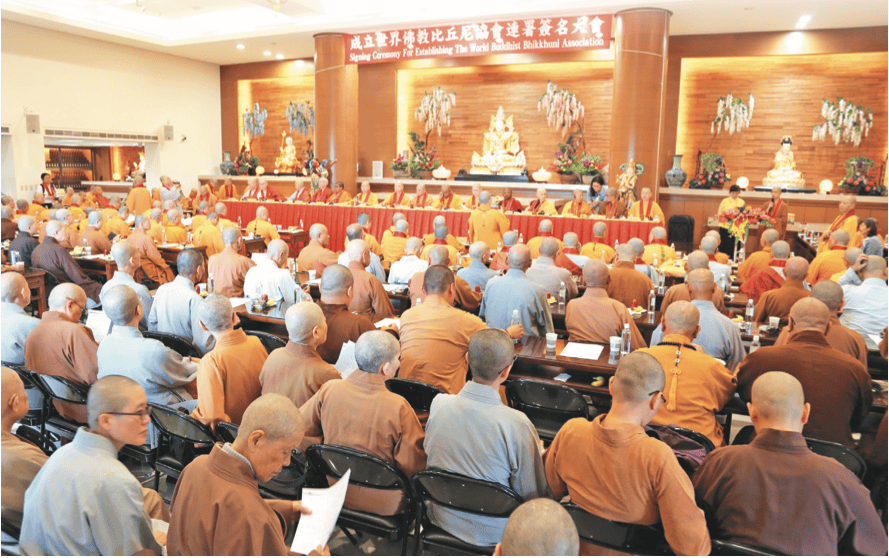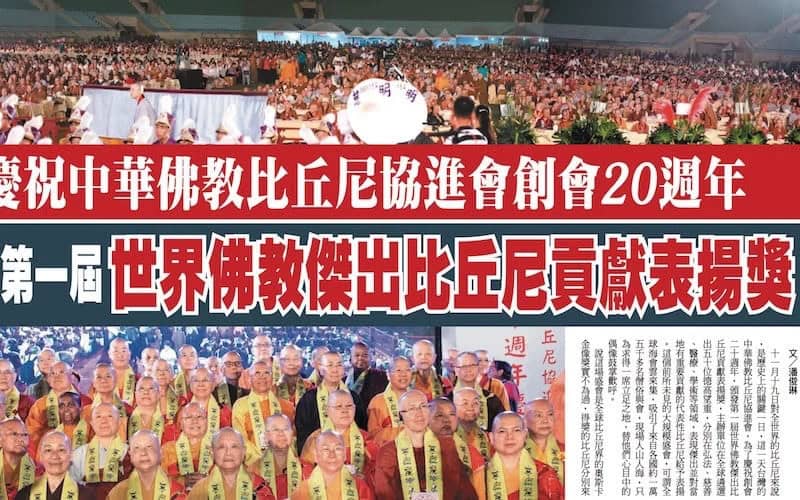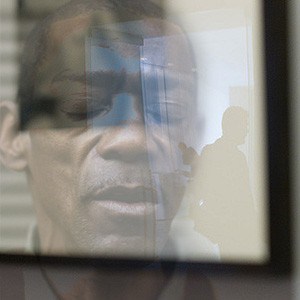The World Buddhist Bhikshuni Association is established in Taiwan

On November 22, 2016, nearly 100 bhikshunis from all over the world signed a memorandum to establish the world's first international organization to be formed by bhikshunis--the World Buddhist Bhikshuni Association. This act is not only a major event in the Buddhist world, but also an unprecedented event in the bhikshuni lineage.
Source: 聯合報, udn.com
Date: Nov 23, 2016
Nearly 100 bhikshunis from all over the world signed a memorandum yesterday (November 22) to organize and later formally establish the world’s first international organization to be formed by bhikshunis–the World Buddhist Bhikshuni Association. This act is not only a major event in the Buddhist world, but also an unprecedented event in the Bhikshuni lineage.
Memorandum signed by nearly 100 nuns around the world
The first chairman is Venerable Master Bhikshuni Pu Hui from Taiwan
During the meeting, the Dean of the Si Chuan Ni Zhong Fo Xue Yuan, Venerable Master Ru Yi, nominated Chairperson of the Chinese Buddhist Bhikshuni Association, Venerable Master Bhikshuni Pu Hui as the inaugural Chairperson of the World Buddhist Bhikshuni Association, citing her noble character and the high esteem she is held in as reasons for her recommendation. With the unanimous endorsement of the bhikshunis from the different countries, everyone applauded and the nomination was accepted. This is the honour of Taiwan.
Venerable Master Bhikshuni Pu Hui said that the 20th anniversary of the founding of the Chinese Buddhist Bhikshuni Association and the associated organization of the first Global Awards for Outstanding Contributions of Commended Bhikshunis has created the rare condition for bhikshunis from 12 different countries to gather in one place. All the awardees are outstanding bhikshunis who excel in their understanding and practice and have contributed selflessly to the Buddhist cause. The move to establish a global organization to unite bhikshunis from the world and harness their strengths is an important effort that has been brought about by causes and conditions and requires no hesitation.
Therefore, the focus of the World Buddhist Bhikshuni Association in future is to actively and widely invite from all the countries in the five continents, registered bhikshuni organizations and associations or monasteries with similar vision to work together to uphold the Buddhist lineage and propagate the wisdom of the Buddhadharma around the world.
The future mission of the World Buddhist Bhikshuni Association is to unite the world’s Buddhist nuns, propagate the Dharma, uphold the Three Jewels, purify the people’s minds through the teaching of Buddhadharma, and engage in charitable, Buddhist cultural and educational activities to benefit the world. The headquarters and main office will be setup in Taiwan.
In addition, the founder of The Outstanding Women in Buddhism Awards in Thailand, Bhikshuni Rattanavali, towards the end of the Forum, personally presented Chairperson of the Chinese Buddhist Bhikshuni Association, Venerable Master Bhikshuni Pu Hui, the title of honorary Chairperson of The Outstanding Women in Buddhism Awards, and Secretary-general Venerable Master Jian Yin as the honorary Vice Chairperson of The Outstanding Women in Buddhism Awards.
http://iwmcf.net/awards
Post-event forum
The Importance of Sangha Education and the Practice of Social Responsibility
The day after holding the first Global Awards for Outstanding Contributions of Commended Bhikshunis at Kaohsiung Zhong Zheng Stadium, the Chinese Buddhist Bhikshuni Association hosted a forum on the theme “The Importance of Sangha Education and the Practice of Social Responsibility” at Ping Tung Wan Fa Temple yesterday. The forum was presided over by the President of the Los Angeles Buddhist Union, Venerable Master Zhao Chu. The participants expressed their views with much enthusiasm.
Venerable Master Zhao Chu said that as a monastic, one has to be able to shoulder heavy responsibilities and be highly dedicated. The Buddhadharma is like a glass of water that has flowed from the distant past to the present, flowing through the times to different places. Only by reinforcing the education of the Sangha will the Buddhist lineage continue to stream forth.
The Dharma spread through the times to different places, and therefore it is inevitable that the method of teaching needs to be adapted. The Buddhadharma is a human-centric religion. How the participants shape Buddhist education today will shape the future of Buddhism.
The Abbess of Taiwan Yuan Zhao Temple, Venerable Master Bhikshuni Jing Ding said that all the abbess bhikshunis in Taiwan are not just engaged in education, but lifelong education. Instructing from deportment to ordinance, monastics must understand the truth in order to be a master. The followers are students. Rituals and public teachings are efforts to spread the Dharma and benefit sentient beings. Every bhikshuni needs to have the loving kindness of the Goddess of Mercy, the compassion of Ksitigarbha, and serve as the light for the Dharma in this degenerate age.
American Bhikshuni Venerable Thubten Chodron said that Wan Fa Temple is a great temple. The collection available is very good for education on Buddhist culture. For practice, she advocated not just focusing on external but also to pay attention to the inner practice. They use chanting to train in meditative concentration.
Bhikshuni Thubten Chodron said that there is a great need for teachings on the Vinaya in western countries. She hoped that in the future more Vinaya scriptures can be translated into English, so that Western monastics could further their cultivation of ethical discipline. In addition to subduing their own minds, they can also serve as examples for their communities and countries, and in the process transform the people around the world, so that the people’s way of life becomes more and more simple and wholesome.
British Bhikshuni Venerable Anandabodhi said she thoroughly agreed with Venerable Thubten Chodron’s views. She mentioned that currently in the United States, a lot of attention is being placed on teaching students meditation. Although American schools cannot promote religion, many elementary schools and high schools are teaching meditation. Although only mindfulness meditation is taught, many previously hyperactive and mischievous students have shown improvement in their behavior after meditation. This has a positive influence in society as a whole.
South Korea Bhikshuni Venerable He Jing pointed out that the Chinese Buddhist Bhikshuni Association has only been established for 20 years, but yet has seen such great achievements, and therefore are worthy examples to be emulated by the Korean bhikshunis. A few days ago, she visited the Ci Ming High School, which was under the leadership of the Abbess of Tai Zhong Ci Long Temple, Venerable Master Chang Lu, and was very moved. Seeing the joy and happiness in the faces of students in the Chinese Buddhist world had made her very happy. She urged that with the establishment of the World Buddhist Bhikshuni Association, the bhikshunis must closely learn from each other and make the world a better place because of Buddhism.
American Bhikshuni Venerable Pannavati said that after arriving in Taiwan she had come to realise her misfortune, because the United States is still not a Buddhist land. She had visited many Buddhist temples in Taiwan and saw in each and every Buddha statue the respect and love of the Dharma. For over two thousand years, the Dharma has been preserved in Asia and has spread to the rest of the world. There are very few monastics in the United States and they have no one to learn from. However, the bhikshunis still persevere and strive to help Buddhism take roots in the west, and do not make compromises despite their lack of resources. At the same time, they also hope that the bhikshunis from the rest of the world can give them guidance, because although many Americans are interested in Buddhism, the Dharma is often misunderstood. Therefore, she hoped there will be more translations of the scriptures and buddha statues in the west, to promote interaction between East and West.
The Abbess of Taiwan’s Miao Chong Temple, Venerable Master Bhikshuni Hong An said that they are now aware of the challenges faced by overseas bhikshunis. She advised them to to continue to work together with bodhicitta motivation to spread the Dharma to benefit more sentient beings. Everyone is responsible to sustain the Buddhadharma. Each and every nun is a bodhisattva, and there is nothing that cannot be accomplished with sacrifices and dedication. Even though everyone is faced with a different set of conditions, everyone must continue to cultivate bodhicitta and support each other, so that all the bhikshunis around the world can grow together.
Abbess of Ci Long Temple cum Chairperson of the Board in Ci Ming High School, Venerable Master Chang Lu said that before classes start in Ci Ming High School, there is five minutes of meditation to allow the minds of students to settle down before they start their studies. For students who have made mistakes and are given demerits, they are given the opportunity to regret and confess their actions by spending 20 minutes in meditation each day in the temple, with the guidance of teachers, to allow their minds to settle and gradually become more aware and transform themselves.
Dean of Si Chuan Ni Zhong Buddhist College, Venerable Master Ru Yi, said that education is the foundation of great achievements. If there is no education today, there will be no Buddhism tomorrow. The Buddha laid down the rules for regulating the body, speech and mind, and monastic rules are observed in the education of Sangha in China. In this age of science and technology, Buddhism has developed to a stage where many Buddhist colleges were set up in Taiwan and mainland China.
In the future, mainland China will have a comprehensive Buddhist University, not only to teach but to contribute to society. As the four requisites of monastics comes from the 10 directions, the quality of Sangha’s education is very important so that they can engender respect for the Sangha in lay people. The Sangha can do so by learning the vinaya to improve their temperament, developing stability to enhance their internal strength and cultivating wisdom to be able to excel in debate.
Abbess of Wan Fa temple, Venerable Master Jian Yin said that while monastic education is very important, lay people’s education is also very important. In her meditation courses, she enables lay people to learn through meditation how to cultivate stability, tranquility and clarity of their minds, and train to maintain mindfulness in adverse situations. This is the “Chan” (zen meditation) that is actively promoted in Taiwan. The aim is to be able to cultivate one’s qualities while abiding in peace and strengthen them while engaged in society.
At the close of the forum, Venerable Master Bhikshuni Jing Ding delivered a thank you speech. She said that over the last few days, the participants had visited various temples, and increased their understanding of the development of Buddhism in Taiwan. She was pleased to have listened to the views of the award recipients from different countries. She congratulated the participants for selecting the right Chairperson for the World Buddhist Bhikshuni Association and suggested that if Venerable Master Jian Yin becomes the Secretary-general, even with just with the two of them, the Association will be able to operate. They will traverse the world to serve everyone. Bhikshunis around the world are always welcome to return to the fold of the World Buddhist Bhikshuni Association. She urged all bhikshunis to work together for Buddhism, so that Buddhism may flourish in the world.
Taiwan’s temples each have their own unique characteristics; international monastics were amazed
In addition to receiving the award, the Chinese Buddhist Bhikshuni Association also arranged for international monastics to visit the important temples in Taiwan. They were dazzled by exquisite, magnificent temples.
The temples which the international monastics visited, included the Kaohsiung Six Turtles Ching Liang Mountain Nation-Protecting Miao-Chiung Temple, Kaohsiung Six Turtle Di Yuan Temple, Fo Guang Shan Buddha Museum, Zhong Tai Chan Monastery, Zhong Tai World Museum, Tai Zhong Ci Ming High School, Tai Zhong Shen Zhai Tang, Shen Zhai Elementary School and Pingtung Wan Fa Temple.
In addition, the Buddhist Association of Taichung and the Taichung City Buddhist Association, Kaohsiung City Buddhist Association, also hosted the award recipients.
The excellent arrangements and warm hospitality of the Chinese Buddhist Bhikshuni Association during the trip really warmed the hearts of all the award recipients. Not only were they wowed by the exquisite, magnificent and classical temples in Taiwan, all the guests also felt genuinely welcomed and truly enjoyed their rewarding trip to Taiwan.
Venerable Thubten Chodron
Venerable Chodron emphasizes the practical application of Buddha’s teachings in our daily lives and is especially skilled at explaining them in ways easily understood and practiced by Westerners. She is well known for her warm, humorous, and lucid teachings. She was ordained as a Buddhist nun in 1977 by Kyabje Ling Rinpoche in Dharamsala, India, and in 1986 she received bhikshuni (full) ordination in Taiwan. Read her full bio.


